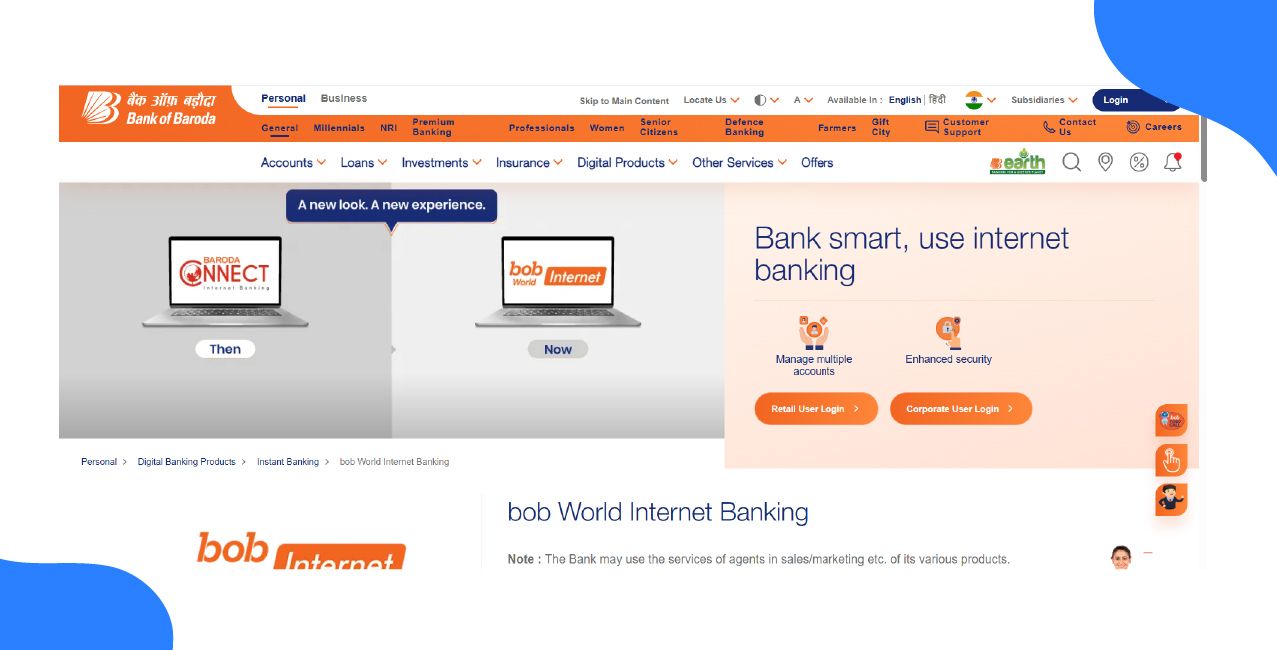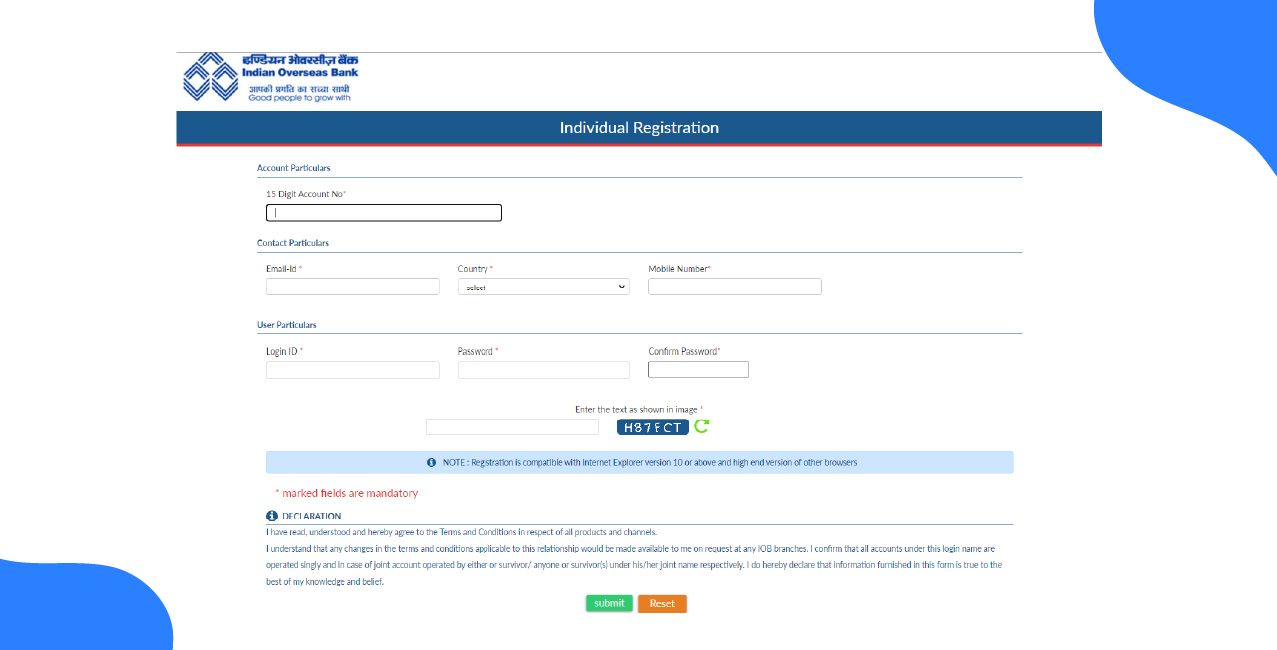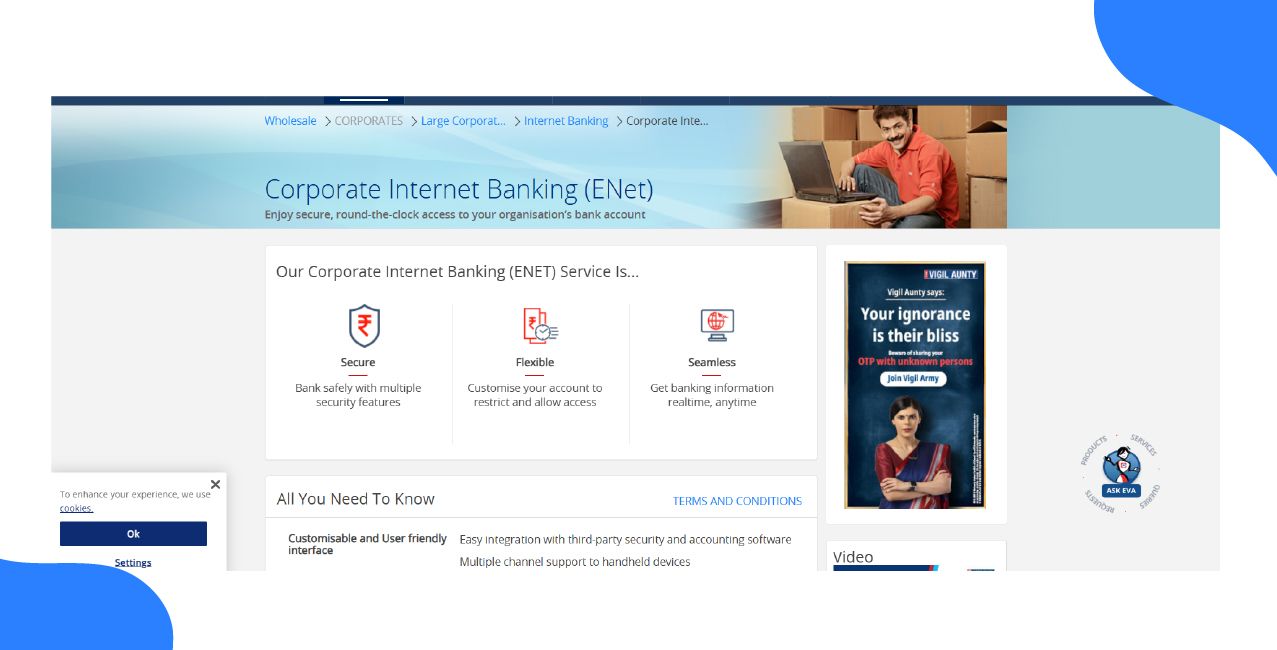
Author
LoansJagat Team
Read Time
10 Minute
20 Jan 2025
Paytm Net Banking – Simplify Your Digital Payments and Banking Needs
Net banking in India was introduced in the early 2000s. It enabled the bank customers to access their accounts through internet service. One could check their bank balances and track financial transactions by using net banking services at any time. Both public sector banks and private sector banks have integrated their banking service with net banking provides seamless banking service.

Today, net banking eliminates the financial exclusion. Because, before the initiation of net banking, many banks were unable to extend their banking services to rural areas. So, people have to visit the bank office for all kinds of transactions. But net banking replaces all the complexities with its comfort-zone banking service in net banking.
Today, there are 295.5 million digital banking users in India.
What is Net Banking?
It is otherwise known as online banking or internet banking. It is an internet-based platform, in which banks provide a plethora of banking services to their customers. With this, one can examine all the transactions and details related to their bank account(s).
Starting from balance checks to applying for fixed deposits, net banking offers innumerable services to bank customers. All these services can be conducted without the need to visit the bank office. Net banking is a 24/7 service where one can access their bank account at any time. The bank customer must have a username and password to avail of the services of net banking.
Paytm Net Banking
Paytm Net Banking is a secure online banking service that allows Paytm users to do all kinds of financial transactions from their Paytm wallet. The user must link his or her bank account to their Paytm wallet. All the features of Paytm Net Banking are user-friendly and allow the users to have smooth banking and transactions.
Features of Paytm Net Banking
Paytm net banking has a wide range of banking services, where a Paytm user can complete it from any comfortable zone.
Features | Descriptions |
Seamless Fund Transfer | A Paytm user can transfer the funds from his or her Paytm wallet to others. |
Bill Payments | It allows users to pay bills for mobile recharge, electricity bills, DTH, and many others. |
Secure Transactions | All the bank transactions are secure and verified with One-Time Password (OTP). |
Multiple Bank Accounts | Paytm user can integrate their multiple bank accounts with the net banking service. |
Card-less Transactions | Transactions are done without a debit or credit card. |
Instant Payments | All the transactions are instantly completed without waiting for a long period. |
Multi-Purpose Use | Paytm users can make purchases on Paytm’s merchant platform, such as mobile phone recharge, movie tickets, and many others. |
Round-the-Clock Service | Banking services are available 24/7. |
Balance Check | Users can check their bank balance immediately. |
Link Paytm Wallet to Bank Account
Step 1: Download the Paytm app from the Android Play Store or the Apple App Store.
Step 2: Enter the mobile phone number that has been linked to your bank account.
Step 3: Select the option “ALLOW” for Paytm to access your phone calls, messages, and your location.
Step 4: Validate your OTP manually or let Paytm do it automatically.
Step 5: You will be taken to the homepage of your Paytm account.
Step 6: Select the profile icon, which is in the top left-side corner.
Step 7: Scroll down a little bit. Select UPI and the payment settings option.
Step 8: On the next page, select “Add Bank Account.”
Step 9: Select the bank that you want to link.
Step 10: Your bank account and mobile phone will be automatically linked.
Step 11: Click your account, and it will take you to another page.
Step 12: On the next page, click “Set Pin.”
Step 13: Click debit card or Aadhaar card to set your PIN.
Step 14: At the bottom, you will see the button “Proceed.” Click it.
Step 15: You need to enter the last six digits of the debit card and its expiry date. After that, click “Proceed.”
Step 16: Validate your OTP and enter your PIN
Step 17: Click the “tick” button on the bottom-right side.
You will be redirected to the home page, as all the registration process for the Paytm App is completed. You are ready to initiate your Paytm payment transactions.

How to Register for Paytm Net Banking
Step 1: Log on to the official website of Paytm. Click the “Login” option on the top-right corner, and select “Personal Banking” or “Corporate Banking” from the dropdown menu. Both options have the same procedures.
Step 2: Click the tab “Don’t have a username? Create Now.”
Step 3: Enter your mobile number, which has been linked to your bank account, and click “Continue.”
Step 4: You may be required to verify your OTP from the registered mobile number.
Step 5: The screen shows “Choose Your Activation Method." There are two types to activate it:
- By debit Card
- By Aadhaar Card.
Select either of these methods and click “Proceed.” For both methods, you need to enter the numbers, such as the debit card number or the Aadhaar card number.
Step 6: You will receive the OTP. Enter the OTP and click “Submit.”
Step 7: On the next step, the screen shows “Set Your Personal Banking Username.” Create a username for your Paytm net banking.
Step 8: The next screen shows “Set New Password.” Create a password, adhering to the guidelines:
- One uppercase, one lowercase, one special character, and one number.
You need to re-enter the created password again for confirmation.
Step 9: Click “Proceed.” The screen will show “Username Activated Successfully.” After that click “Login.”
Step 10: Enter the username and password to log in.
Step 11: You will receive the OTP to your registered mobile number. Enter it and click “Verify.”
Step 12: On the next page, select your bank account and click the tab “Proceed.”
You have created Paytm Net Banking successfully. You can use it for banking services.
How to Log into Paytm Net Banking

Step 1: Log on to the official website of Paytm.
Step 2: Click “Login” on the top-right corner and select “Personal Banking” or “Corporate Banking.” However, both types have the same procedures to log into your net banking account.
Step 3: On the next page, enter your username and password for signing in.
Step 4: After logging in, you will have various banking services of the net banking service.
Step 5: Choose the service that you want to avail.
How to Add Beneficiary in Paytm Net Banking
Step 1: Log on to the official website of Paytm.
Step 2: Click “Login” on the top-right corner and select “Personal Banking” or “Corporate Banking.” However, both types have the same procedures to log into your net banking account.
Step 3: On the next page, enter your username and password for signing in.
Step 4: Click the “Fund Transfer” option in the dashboard menu.
Step 5: Locate the option “Add Beneficiary” and click on it.
Step 6: A new tab will be opened, where you need to enter the following details:
- Name of the Beneficiary
- Bank Account Number.
- IFSC Code (Google the name of the branch to find the IFSC Code).
- Bank Account Type.
Step 7: Verify the beneficiary by validating the OTP.
Step 8: Click “Add.”
There may be a waiting period for adding beneficiaries in the net banking. After that, you can send the funds.
How to Transfer Funds?
Procedures for NEFT transfer
Step 1: Log on to the official website of Paytm.
Step 2: Click “Login” on the top-right corner and select “Personal Banking” or “Corporate Banking.” However, both the types have the same procedures to log into your net banking account.
Step 3: On the next page, enter your username and password for signing in.
Step 4: Select the option “Transfer Funds” and choose “NEFT Transfer.”
Step 5: Select the beneficiary to whom you want to transfer the funds. The details about the beneficiary will be displayed.
Step 6: Enter the amount to transfer.
Step 7: Authenticate the transaction through OTP verification.
Step 8: After verification, initiate the transfer by clicking “Confirm”.
You will receive a confirmation SMS. You can check the bank balance on the home page.
Procedures for RTGS transfer
Step 1: Log on to the official website of Paytm.
Step 2: Click “Login” on the top-right corner, and select “Personal Banking” or “Corporate Banking.” However, both the types have the same procedures to log into your net banking account.
Step 3: On the next page, enter your username and password for signing in.
Step 4: Select the option “Transfer Funds” and choose “RTGS Transfer.”
Step 5: Enter the payee’s account number and other details related to it.
Step 6: Enter the amount for the transaction.
Step 7: Initiate the transfer. After that, you will receive a transaction reference number. Keep this number for future reference.
Limitations in Amount Transfer
Fund Transfer Type | Transaction Amount | Service Charges |
NEFT | Unlimited | NIL |
UPI | Unlimited | NIL |
IMPS | ₹ 500,000 lakhs | ₹ 2 to ₹ 15 |
RTGS | Unlimited | NIL |
Paytm Customer Care
If you have any queries and face technical glitches on the Paytm App, you can reach their supporting team for customers through their app:
Step 1: Open your Paytm app.
Step 2: Click the profile icon.
Step 3: Select the “24/7 Help & Support” section.
Step 4: Submit your queries in the “Chat” box.
You can also refer to this table for customer care support from the Paytm team
Helpline Number | 0120-4456-456 |
Email Address | nodalofficer@paytmbank.com |
Conclusion
The introduction of net banking in Paytm makes the banking process very easy. A user can avail of all the banking services in his comfort zone. Ever since the integration of the Internet with the banking sector, the process has become quite easy. Net banking connects the rural population with banking services, and Paytm Net Banking remains a game-changer.
FAQs Related to Paytm Net Banking
How many bank accounts are permitted to link in Paytm Net Banking?
You are permitted to add a maximum of 5 bank accounts.
Is Paytm Net Banking safe and secured?
Yes, it is safe and secure. Only you can access and initiate net banking.
What is the maximum limit of UPI transactions in Paytm?
The maximum limit is ₹ 1,00,000 lakhs.
Is it available for 24/7 banking service?
Yes, you can avail of the banking services at anytime
How many beneficiaries can be added in Paytm Net Banking?
You can add any number of beneficiaries to your Paytm Net Banking.
Other Net Banking Services | |||
About the Author

LoansJagat Team
‘Simplify Finance for Everyone.’ This is the common goal of our team, as we try to explain any topic with relatable examples. From personal to business finance, managing EMIs to becoming debt-free, we do extensive research on each and every parameter, so you don’t have to. Scroll up and have a look at what 15+ years of experience in the BFSI sector looks like.

Quick Apply Loan
Subscribe Now
Related Blog Post


